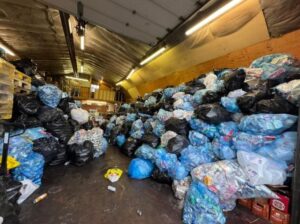During last Tuesday’s regular meeting, MP for Peace River Westlock Arnold Viersen provided Woodlands County Council with an update from his position in the federal legislature. Viersen focused on five main topics in his presentation. Firstly, he spoke about the budget that is now in place at the national level. “The latest is we have a budget now. I know this would surprise municipal councillors, but for over two years, we haven’t had a budget. The entire COVID response has been without a budget. Typically, before you go out and do something, you set up a budget to have a benchmark to say that we met the budget or blew the budget, or we did better than we anticipated and here are the things we are going to spend the money on. That never really happened throughout COVID. We could only speculate as to how things were going to be rolling out.”
Viersen said that the budget confirmed the debt facing Canadians. “We are 1.3 trillion dollars in debt as a country now, which is roughly $50,000 per person in Canada. Three hundred thirty billion dollars (from last year’s budget) was funded by printing money. If you’ve been to the grocery store or the hardware store lately and wonder why everything is more expensive, that may have something to do with it. The fact that Canada is just printing money is likely devaluing our currency. So that is a major challenge,” he explained. He said that his Conservative government is calling to remove the carbon tax on the propane and natural gas that farmers use to dry their grain. Though he said it did not sound like they would remove it, there was some potential positivity ahead. “It sounds like there’s going to be some rebate program going forward. We will see if that program actually comes out.”
Viersen then brought up Bill C-10. Initially introduced by the Liberals to bring companies such as Netflix under the CRTC, meaning they would be required to set money aside from Canadian content, the bill ended up changing. “At committee, the Liberals removed a clause in there that said it would not apply to social media platforms such as YouTube or Facebook. So, anybody with a Facebook page or YouTube channel could be subject to the CRTC rules which don’t provide a lot of clarity for anybody and is a massive infringement on freedom of speech.” The backlash to the change seemingly forced the Liberals to backtrack. “They said the bill is paused now. We have got a review of the constitutionality of the bill happening again, and the government has said that they have amendments they would like to bring again, which is unheard of. We’ve never had this before.”
Another big topic in the headlines these days is Line 5. Viersen spoke about the implications and frustrations connected with it. “That’s a pipeline that runs from Edmonton to Sarnia, and it runs through Michigan for a little while. The Governor of Michigan had said on May 12, the easement for that pipeline would be removed so that pipeline wouldn’t be operating.” Viersen questioned the government about the pipeline back in February. They told him the pipeline was “non-negotiable.” He said that was interesting. “I called Line 5 the magic pipeline because it’s magically changed the Liberal’s opinions on pipelines. Suddenly, they are talking about how pipelines are the safest way to move crude oil, and if we got rid of this pipeline, we would have to put in eight thousand rail cars on the rail and 15 thousand trucks on the road to maintain this pipeline’s capacity. It’s extremely frustrating that we had Energy East, Northern Gateway, Trans Mountain, and Keystone XL. All these other pipelines, those same arguments apply, and yet we’ve seen this government be against pipelines until it was line 5. When southern Ontario and Quebec are at risk of losing jobs and fuels, they are suddenly in favour of pipelines.”
Viersen explained that after calls to do something, the government brought the action into an American court. “We have a treaty with the United States, signed back in 1977, that basically guarantees that our pipelines will operate across the border. Back in 1977, it was the Americans that wanted that treaty, and then-Senator Joe Biden actually ratified that treaty. Maybe remind Mr. Biden about this treaty they worked on back in 1977 to keep that pipeline going. Trudeau claims to have political alignment with the Democrats down south there, but that hasn’t seemed to have helped with Keystone XL or Line 5.”
One of the last big topics Viersen brought forward concerned a resolution for equalization from his colleague Tom Kmiec (Calgary). “He has brought this resolution forward, and it does three things. It makes it so that the Federal and Provincial Transfers Act would be renamed the Equalization Act so that when we talk about those things, we would actually be able to find it. It would also remove the cap on the equalization transfer.” Viersen explained that the Revenue Stabilization Program is to help provinces that suffer a significant dip in revenues. “For some reason that no one can explain, there’s a $60 cap per capita on that transfer.” He said that removing the cap would provide Alberta with 6-8 billion and that the cap is the only thing keeping that help from coming. “The Liberals have kind of answered that a little bit and raised the cap to $160 per person, which helps a bit, a two billion dollar bump, but if this program exists to help provinces out when they have a dramatic decrease in revenue, then why should there be a cap on it?”
He said the resolution would also make the equalization formula public. “We could all scrutinize it. At this point, nobody understands equalization because the government kind of just decides things and then hands out the money as they see fit.” He said that he would love to have Woodlands County Council endorse the bill.








More Stories
Community spirit shines at large-scale youth baseball event
Birthday party chaos sung beautifully by Pumpjack Players’ youth in spring musical
Gearing up for another season of cars, cruising and camaraderie